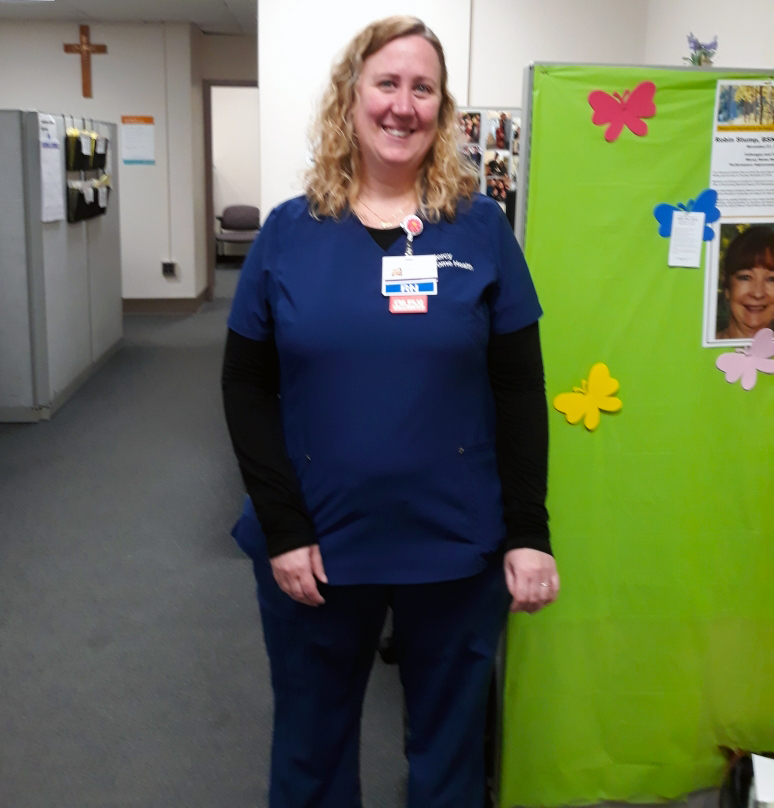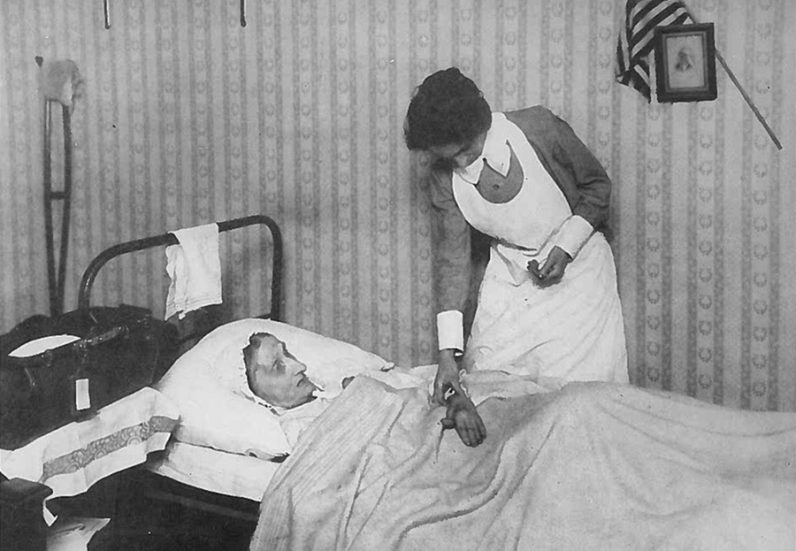
Registered nurse and case manager Colleen Lihotz of Mercy Home Health (MHH) is on the frontlines of the COVID-19 pandemic, serving hundreds of elderly clients who also receive spiritual support through MHH’s prayer companion ministry. (Photo courtesy of Angelica Flynn /AKCG)
The area’s largest Catholic medical system is battling the COVID-19 pandemic with science and spirituality, as home health care workers and volunteers team up to heal patients’ bodies and souls.
“We have a unique service,” said Ruth Martynowicz, vice president of operations for Mercy Home Health (MHH).
The Medicare-certified agency provides skilled intermittent care to clients recovering at home after hospitalization. MHH is part of Trinity Health Mid-Atlantic, which includes Mercy Fitzgerald, Mercy Philadelphia and Nazareth Hospital, St. Mary Medical Center and St. Francis Healthcare.
Through MHH’s Mercy-Ful Companion Program, a volunteer calls patients at home “to touch base, to give them someone to talk to, and to pray with them,” said Martynowicz.
Launched in 2002, the companion program counts some 535 telephone visits per year, said mission leader Carol Primavera Paris.
Among the spiritual resources used by the companions are prayers of St. Augustine, St. Francis and St. Teresa of Avila, said Paris, as well as prayers to St. Joseph and “prayers of gratitude.”
Volunteers also invite patients of other faith traditions to pray according to their beliefs, asking for divine healing and guidance, said Sister of St. Francis Moira Frawley.
Sister Moira, who became a Mercy-Ful Companion just weeks prior to the coronavirus outbreak in the U.S., said “it’s a privilege to listen and pray” with some of the 33,000 patients served by MHH each year.
“It’s uplifting for the patient to have somebody call, and to know there’s a healing institution that cares enough to follow up,” she said.
The outreach has taken on new urgency during the pandemic, especially since most of MHH’s clients are elderly.
“There’s a lot of worry and a lot of anxiety among them, despite the fact they’re practicing social distancing and staying at home,” said registered nurse and MHH case manager Colleen Lihotz.
[hotblock]
She noted that many patients are “very lonely, separated from other family members,” as well as “scared about their own health.”
“This isn’t like diabetes,” she said. “It’s unknown and uncharted for them.”
Adding to their concerns is an awareness that “nurses and physical therapists are coming into their homes after being in other homes,” she said.
Like many health care systems, MHH has had to “take every avenue” in securing adequate supplies of PPE (personal protective equipment) for its staff, said Martynowicz. When face masks ran low, MHH quickly sourced stock from Trinity’s hospitals as well as a sister agency in Massachusetts.
“We could see (the increased demand) coming, and we jumped in and found a way to make it work,” Lihotz said.

A visiting nurse from Delaware County-based Community Nursing Association tends to an elderly patient in 1913. The association eventually became what is now Mercy Home Health, which is working to provide both medical and spiritual support to thousands of elderly clients in the greater Philadelphia area. (Photo courtesy of Mercy Home Health / Trinity Health Mid-Atlantic)
Adapting to crisis is part of the organization’s DNA, said Martynowicz, since MHH has more than a century of experience on the medical frontlines.
The organization traces its roots to two visiting nurse associations that began caring for Delaware County’s poor and disadvantaged populations in 1910.
The nurses tended to patients amid the Spanish flu pandemic of 1918, “taking care of moms and babies, whatever illness came up during that time,” Martynowicz said.
In the 1960s, the Medicare Home Care Program spurred hospitals to form their own home care departments, and over time the visiting nurse associations were incorporated into the hospitals that eventually merged into the Mercy and later Trinity systems.
MHH’s focus on both physical and spiritual well-being helps to address other key factors in patient recovery, said Sister Moira and Lihotz.
Visiting patients in their actual homes enables staff to “see the other needs,” Lihotz said, such as “struggling to get food or keep the lights on.”
She and her colleagues alert social workers in such cases to connect clients with additional resources.
At the same time, said Sister Moira, the patients’ caregivers also need support — even if they can’t be with their loved ones due to the coronavirus.
“I’ve had two caregivers who were able to share with me quite a bit, with tears, saying how difficult it is for them,” said Sister Moira.
Martynowicz said that in her four decades of nursing she had “never experienced anything like” the COVID-19 pandemic, but that her staff were up to the challenge.
“For them, this is more than a job; it’s a calling,” she said.
Paris added that her team shared the same perspective, regarding their outreach as a way of “showing God’s outpouring of love … through the mission of home health.”
PREVIOUS: Knights of Columbus donate $50K to archdiocesan food cupboards
NEXT: Gesu School honors alum who’s an emerging leader



Share this story